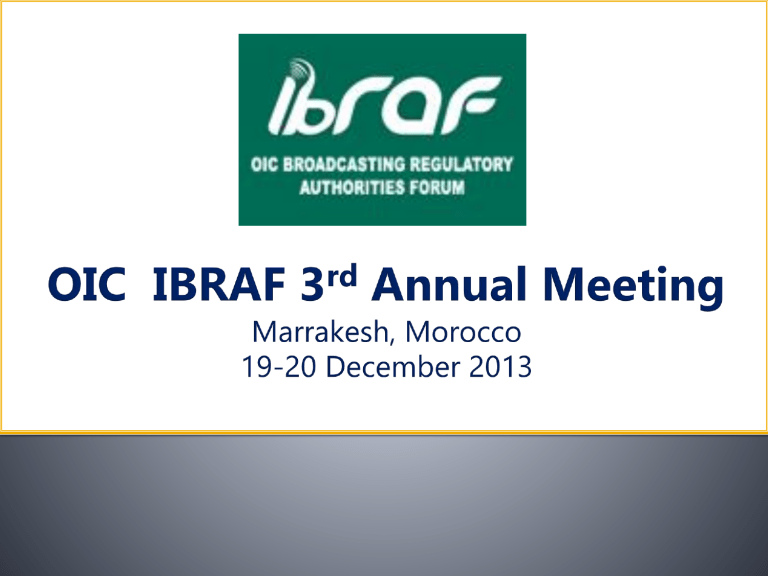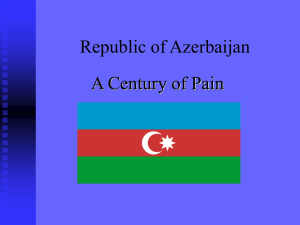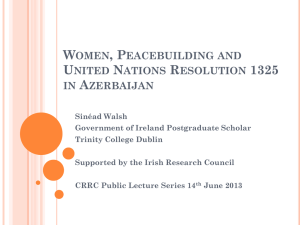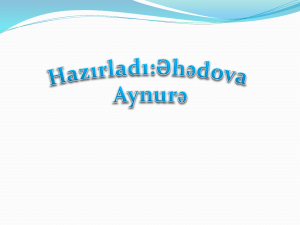Azerbaijan

Presentation by Fazil H.Novruzov
(NTRC, Legal and International Relations Department, Senior advisor)
December, 2013
Television and Radio
Broadcasting in
Azerbaijan
The history of Azerbaijan radio began in twenties of last century.
The first radio transmitter in Baku was installed in 1924 and in
1926 the first radio station began to transmit.
The first television programme in Azerbaijan began to broadcast on February 14, 1956.
9 nation-wide television broadcasters:
1) AZTV (state-run channel)
2) Culture Azerbaijan (state-run channel)
3) Sport Azerbaijan (state-run channel)
4) ICTIMAI (public service broadcaster)
5) ANS TV (private broadcaster)
6) Space TV (private broadcaster)
7) Lider TV (private broadcaster)
8) ATV (private broadcaster)
9) Khazar TV (private broadcaster)
1 satellite broadcaster
–
Caspian Broadcasting Company – CBC
(private)
14 nation-wide radio broadcasters
12 regional TV broadcasters
12 cable network broadcasters
Till 2002, television and radio broadcasting sphere was regulated by the Law of the Republic of
Azerbaijan “On mass media” of July 21, 1992.
On August 6, 1998 the President of the Republic of
Azerbaijan signed the Decree “On additional measures to protect freedom of speech, thought and access to information in the Republic of Azerbaijan”.
At a moment, television and radio broadcasting in the
Republic of Azerbaijan is regulated by the Law of the
Republic of Azerbaijan “On Television and Radio
Broadcasting” adopted in 2002.
However, public broadcasting is regulated by the
Law of the Republic of Azerbaijan “On Public
Television and Radio Broadcasting” adopted in 2004.
Applying of administrative measures on broadcasters is regulated by the Code of the Republic of
Azerbaijan on Administrative Infringements.
During elections agitation and election propaganda in television and radio are regulated by Election Code.
By the Decree of the President of the Republic of
Azerbaijan dated October 5, 2002 National
Television and Radio Council of the Republic of
Azerbaijan (The Regulatory Authority in the sphere of television and radio broadcasting) was established.
National Television and Radio Council is created in 2002.
The Council is consisting of 9 members which are appointed by the President of Azerbaijan for the term of 6 years and which can be dismissed only upon own free will.
National Television and Radio Council is financed by state budget.
NTRC does not interfere in editorialand financial activity of broadcasters.
Main duties of the Council are:
to regulate television and radio broadcasting activities;
to protect the independence of broadcasters and public interests;
to carry out supervision on implementation of laws on television and radio broadcasting .
The Council turns its attention mainly to:
non-dissemination of information that threats state independence and territorial integrity;
prevention from hate speech,agitation of hatred, terrorism, violence, national, racial and religious discrimination, pornography and drugs;
implementation of license provisions by broadcasters;
showing of programs that have harmful influence on physical, mental and moral development of minors in a time which they cannot view them.
National Television and Radio Council can apply following sanctions and measures:
First Written Notification
Second Written Notification
Third Written Notification
Penalty (up to 2000 manats – 2560 USD)
Bring an action against broadcaster or content provider demanding of License revocation.
In 2006 International Telecommunication
Union adopted the Regional Agreement Plan
(RRC, Geneva 2006) according to which,
437 radio frequencies in 33 zones are allocated for Azerbaijan.
Radio Frequency Zones allocated for
Azerbaijan:
On 10 February 2011 the Cabinet of Ministers of the Republic of Azerbaijan adopted
Decision No.26 on “Confirmation of program on application and development of DVB-T digital television broadcasting in the territory of the Republic of Azerbaijan”.
According to the decision adopted in
December 22, 2011 by National Television and Radio Council Digital Terrestrial
Television (DTT) launched in big cities and in all border regions.
Now analogue and digital broadcasting are carried out simultaneously.
Analogue switch off is planned by 2014.
Transition to digital broadcasting in Azerbaijan consists of 2 stages:
The first stage has covered the period of 2011-2012.
Digital broadcasting with one open packet (8-12 channels) was launched in the big cities and in all border regions.
All existing analogue radio-relay lines (RRL) were replaced with digital ones.
Digital broadcasting network which covers nearly
60-70% of the population of country has been built.
The second stage covers the period of 2013-2014.
During this stage it is planned to elaborate legislative acts, normative-technical documentations, licensing rules and conditions as well as license tariffs.
The main goal of this stage is to begin overall digitalization of television broadcasting network of the country and application of DVB-T receivers and set-top-boxes.
It is planned to launch second or more packets
(multiplexes, each of 8-12 channels) and to provide all territory of the country with digital TV broadcasting by the end of this stage.
Wide spreading of cable networks among population
It makes the process of transition to digital broadcasting in Azerbaijan “painless”.
Almost all of big sities of Azerbaijan are covered with digital cable network.
Cable network subscribers, in first periods, no need to get decoders, because they already have digital cable receivers.
The main issue is providing of population from remote regions with set-top-boxes.
Azerbaijan Government will provide indigent families with free decoders.
Azerbaijan began to produce decoders. For instance, now PEYK factory of the Ministry of
Defense Industry is producing them.
Legislation:
Article 33 of the Law on television and Radio
Broadcasting
– Protection of Minors
Special Provisions of the Council
– covers programs which are being transmitted without codes and might damage physical, mental and moral development of minors, also programs that contains erotic and violence.
According to the Provisions the following programs are prohibited to transmit between
07.00 and 23.00:
Films which mainly contain cruelty and violence;
Films which describes physical and psychological violence, sadism, vandalism, torture, dead bodies;
Horror films;
Films which contain scenes of occultism, spiritualism, some mystic behaviors, showing of horror creatures;
Scenes of medical operations which can impact on man’s psychology;
Shows of hypnosis;
Programs and films which describe criminal activity, suicide;
Erotic films and programs;
Films and programs which show sexual acts, describe sex orientations, talk shows about sexual relations;
Films and drama which contain bad language, swearing words and gestures.
Only in some cases these information are allowed to transmit and are not considered as a category that might damage physical, mental and moral development of minors.
Thank you very much for your attention!
Fazil H.Novruzov (Senior advisor, Legal and International Relations Department, NTRC)
Azerbaijan, Baku, AZ-1000, Nizami Str.145
Tel.: (99412) 598-36-59 ; 493-09-13
Fax: (99412) 498-76-68
E-mail: office@ntrc.gov.az
Web: www.ntrc.gov.az





